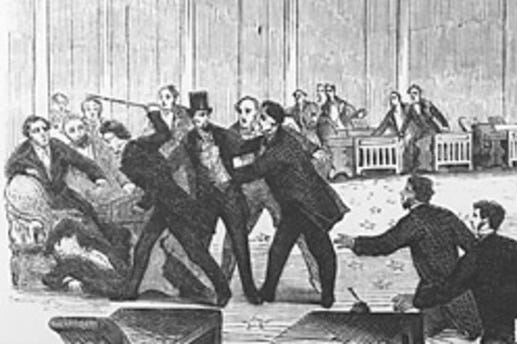I demand satisfaction
what ever happened to duelling?
There was a time when gentlemen (mostly) revered a code of conduct. If someone was publicly called out as a coward or a thug, he might demand satisfaction from his accuser.
One method of resolving the dispute between the accuser and the accused was a duel. Choosing the place (termed a “field of honor”) and the weapon was the prerogative of the accused.
The point of the duel, if I have it right, was not necessarily the death of one or the other but rather calling for a duel and accepting the challenge was a way to signal to the world: “I stand by my language and my actions to the point where I am willing to put my life on the line.” Some duels were halted at the first sign of blood, or when one or the other party was unable to fight or shoot, or whack at the other with a sword.
But revering a code of conduct is not the same as acting in accord with it. Occasionally history gives us a rich story in which hypocrisy is called out. Such was the case with a chain of events precipitated by the caning of Senator Charles Sumner (R-Massachusetts) by Congressman Preston Brooks (D-South Carolina). You see, Sumner (an Abolitionist) had several days previous made a speech denouncing slavery and criticizing some Southern congressmen by name. Enraged by this, Brooks wanted to challenge Summer to a duel, but was persuaded otherwise. Brooks would instead unapologetically beat Sumner unconscious on the floor of the Senate, June 1856. “Bully” Brooks enjoyed a popularity surge from his confederates following the assault.
Enter Anson Burlingame, Congressman from Massachusetts, who delivered a fiery speech to Congress which included a defense of his wounded compatriot. He called out Brooks as “the vilest sort of coward,” and peppered his attack with language designed to provoke Brooks:
“I denounce [the attack on Sumner] in the name of the Constitution which it violated. I denounce it in the name of Massachusetts, which was stricken down by the blow. I denounce it in the name of civilization, which it outraged. I denounce it in the name of humanity. I denounce it in the name of that fair play which bullies and prizefighters respect…Call you that chivalry? In what code of honor did you get your authority for that?”
And so many other ways of saying “You call yourself a gentleman?”
Brooks took the bait, and challenged Burlingame to a duel, expecting him to ignore the challenge or back down, which would lead Burlingame to being socially ridiculed. However, not only did Burlingame accept, he did so amazingly quickly and chose the weapon — rifles — and location — the Navy Yard in Niagara Falls on the Canadian side to circumvent the prohibition on dueling in the US.
Which was brilliant. First of all, Anson was a sharpshooter (having been raised in what was then the wild west — Ohio and Michigan). Second of all, there was no way Brooks had the courage to cross through that much Yankee territory to get to the “field of honor.” He never showed up.
I understand that we, as a people, have evolved beyond duelling. Its decline is related to the ascent of state capacity — specifically the ability of government to enforce law and order. Aggrieved parties have less bloody avenues to pursue satisfaction and restore their honor.
But there was something elegant and efficient about standing your ground, daring the other to blink. During Burlingame’s speech, when by his description Brooks “stole into the Senate…and smote [Sumner] as Cain smote his brother” an ally of Brooks, Laurence Keitt, spoke out:
“That is false,” said Keitt from his seat.
Now pause here and fast forward to the 2020’s when allegations of falsehoods and lies are shouted in the halls of Congress, then echoed in the halls of the media. The exchange is similar to children arguing on an elementary school playground:
“Cheater!” “YOU cheated!!” “No, YOU cheated, Cheater.”
“Boo! Liar! You Lie!” “You tell lies the likes of which we have never seen. Huge lies. It’s sad.”
Compare the above puerility to this dialogue in 1856.
Mr. Keitt: That is false.
Mr. Burlingame: I will not bandy epithets with the gentleman. I am responsible for my own language. Doubtless he is responsible for his.
Mr. Keitt: I am.
Mr Burlingame: I shall stand by mine.
And he continued his account, poised, passionate and undeterred.
Today the chivalric code is all but gone. “My word is my bond,” sounds quaint. “I swear on my mother’s grave…,” might be used for effect…
But we are running out ways to reclaim our honor. Meanwhile, name-calling seems to be the go-to method.
Has anyone in history ever suggested it would be for the best if we simply not tell falsehoods and not make false accusations?
“I hold myself accountable for my words and for my actions,” — or something along these lines — seems like a starting point.
Anyone? Anyone?



Bueller? 😉 Appreciate the thoughts here, Stew. Our legal system is meant to stand in for dueling, I suppose, and is the best we have, but even that is corrupted by power and bias.
Recently, in one of those conversations we all have with someone in passing, a friend commented on how distressing it is that we equate wealth with success, being rich with being admirable. How foolish of us to believe that having monetary assets makes us more credible, or beyond reproach. As it is, and in the absence of dueling, we have nothing to settle the score, nothing to shove us out of our kindergarten mindset. Thus “we” persist in behaving and believing like children. Maddening. I
I wish I had the time and bandwidth to tackle the book mentioned here. The essay itself is compelling. https://www.newamerica.org/the-thread/atossa-abrahamian-wealthy-exploit-global-gray-zones/
Come on back here it’s merely a flesh wound! Said the one armed knight